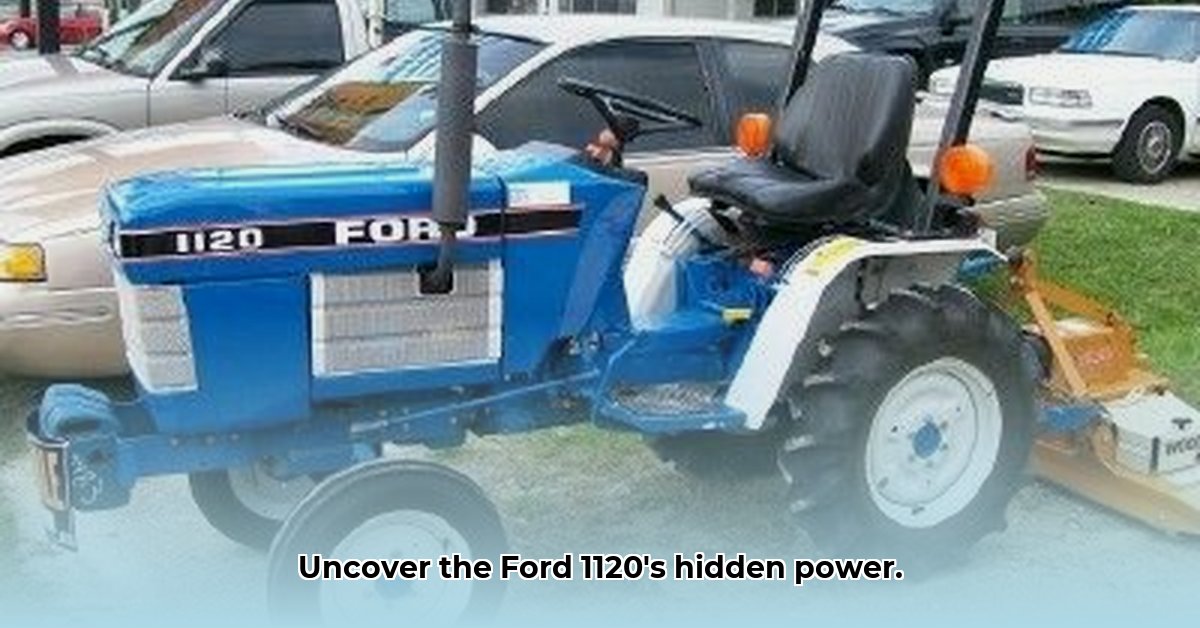
The Ford 1120, a compact tractor produced from 1987 to 1993, offers a compelling blend of vintage charm and practical functionality. While not a powerhouse, its reliability and maneuverability make it a worthwhile consideration for specific tasks, particularly for collectors and those with smaller properties. This review delves into its history, performance, and the realities of ownership in the modern era. For more on Ford's tractor history, check out this helpful resource: Ford Tractor History.
Technical Specifications and Design
The Ford 1120, manufactured by Shibaura for Ford, boasts a compact build ideal for smaller applications, such as landscaping or small-scale farming. Its core is a robust three-cylinder diesel engine, typically delivering around 14 horsepower – sufficient for many tasks but not demanding fieldwork.
| Specification | Details |
|---|---|
| Engine | 0.9-liter, three-cylinder diesel |
| Horsepower | Approximately 14 hp |
| Weight | Approximately 1350 lbs |
| Transmission Options | Standard gear, hydrostatic |
| ROPS | Standard two-post Roll Over Protective Structure |
| Dimensions | Compact dimensions (specific measurements unavailable) |
This compact design, coupled with available hydrostatic transmission options, provided excellent maneuverability in tight areas. The inclusion of a ROPS (Roll Over Protective Structure) showcased a commitment to operator safety, a feature not always standard in similar tractors of that era. Was the 1120's design ahead of its time? While not revolutionary, it offered a practical combination of features.
Historical Context
Created through a collaboration between Ford and Shibaura, the Ford 1120 targeted a specific market segment: owners requiring a compact and affordable tractor for lighter tasks. Competing against similar offerings from Kubota and Yanmar, the 1120 likely benefited from the established Ford name and reputation for dependability. An estimated original price of around $9,000 (1993 dollars), adjusted for inflation to approximately $20,000 today, positioned it as a cost-effective solution compared to larger, more powerful tractors. Did this affordability contribute to its success? Its market penetration suggests a positive correlation.
Performance and Capabilities
The Ford 1120's 14 horsepower is well-suited for jobs such as mowing, light tillage, and snow removal. Its compact size is a significant advantage, enabling effortless navigation in confined spaces. However, its power limitations preclude it from heavier agricultural tasks. Its capabilities align perfectly with its intended target market; expecting more would be unreasonable. The question remains: was its performance adequate for its intended role? Considering its widespread adoption, it seems likely.
Market Value and Collectibility
Today, the Ford 1120 enjoys a growing collector's market. Its relative rarity, combined with the increasing appreciation for vintage agricultural machinery, contributes significantly to its value. Tractors in excellent condition command a higher price. The level of restoration heavily affects this value. Is it a sound investment? While values fluctuate, the rising interest suggests a potential for continued appreciation, however, this is not guaranteed.
Ownership and Maintenance
Maintaining a Ford 1120 requires attention to detail. Sourcing parts can be challenging due to its age and discontinued production. Online retailers specializing in vintage tractor parts, local agricultural equipment dealers, and online forums dedicated to Ford tractors are essential resources. Remember to consider the possibility of aftermarket parts to supplement. Preventive maintenance is paramount. Regular checks of the engine and hydraulic components are crucial in preventing costly failures.
Conclusion
The Ford 1120, while technologically simpler than modern tractors, offers a unique combination of compact design, manageable power, and vintage appeal. While maintenance and parts sourcing can present challenges, the rewards of owning this robust machine can be substantial, particularly for small-scale operations or enthusiasts. For the right owner, the Ford 1120 remains a practical and rewarding choice.